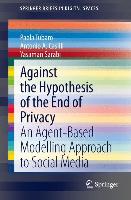Against the Hypothesis of the End of Privacy
Several prominent public voices have advanced the hypothesis that networked communications erode the value of privacy in favor of a transparent connected existence. Especially younger generations are often described as prone to live "open digital lives". This hypothesis has raised considerable controversy, polarizing the reaction of its critics as well as of its partisans. But how likely is the "end of privacy"? Under which conditions might this scenario come to be? What are the business and policy implications? How to ethically assess risks and opportunities? To shed light on the co-evolution and mutual dependencies of networked structures and individual and collective strategies towards privacy, this book innovatively uses cutting-edge methods in computational social sciences to study the formation and maintenance of online social networks. The findings confound common arguments and clearly indicate that Internet and social media do not necessarily entail the end of privacy. Publicity is not "the new norm": quite to the contrary, the book makes the case that privacy is a resilient social force, resulting from a set of interconnected behaviors of Internet users.
Verschillende prominente publieke stemmen hebben de hypothese naar voren gebracht dat netwerkcommunicatie de waarde van privacy uitholt ten gunste van een transparant verbonden bestaan. Vooral van jongere generaties wordt vaak gezegd dat zij geneigd zijn een "open digitaal leven" te leiden. Deze hypothese heeft tot heel wat controverse geleid en de reacties van zowel de critici als de aanhangers gepolariseerd. Maar hoe waarschijnlijk is het "einde van de privacy"? Onder welke voorwaarden zou dit scenario zich kunnen voltrekken? Wat zijn de gevolgen voor het bedrijfsleven en het beleid? Hoe moeten risico's en kansen ethisch worden beoordeeld? Om licht te werpen op de co-evolutie en wederzijdse afhankelijkheid van netwerkstructuren en individuele en collectieve privacystrategieën, maakt dit boek op innovatieve wijze gebruik van geavanceerde methoden uit de computationele sociale wetenschappen om de vorming en instandhouding van online sociale netwerken te bestuderen. De bevindingen weerleggen gangbare argumenten en geven duidelijk aan dat internet en sociale media niet noodzakelijk het einde van privacy betekenen. Openbaarheid is niet "de nieuwe norm": integendeel, het boek bepleit dat privacy een veerkrachtige sociale kracht is, die het resultaat is van een reeks met elkaar verbonden gedragingen van internetgebruikers.
€69.95

Geef een reactie
Je moet ingelogd zijn op om een reactie te plaatsen.